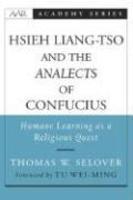
Book Summary
Hsieh Liang-tso (c.1050-c.1120, known as master Shang-ts'ai) was one of the leading direct disciples of Ch'eng Hao and Ch'eng I, the two brothers who were the early leaders of the Confucian revival known as Neo-Confucianism in Northern Sung China. Hsieh was thus among the first to recognize and follow the insights of the Ch'eng brothers as definitive of the authentic Confucian tradition, a recognition that became the conviction of the majority of later Confucian scholars and practitioners. The present book is a focused analysis of the core value of Confucian thought, namely jen (humanity or co-humanity), through an investigation of Hsieh Liang-tso's analysis of the Analects of Confucius. Selover argues that Hsieh's handling of key issues in interpreting and applying the Confucian Analects, his experiential reasoning and his deference to scriptural classics and earlier tradition, bear important similarities to the practice of theology in Western religious traditions. The volume also contains a translation of Hsieh's commentary on the Analects, as well as a foreword by the renowned scholar of Confucianism, Tu Wei-ming.
Book Details
| Book Name | Hsieh Liang-TSO And The Analects Of Confucius: Humane Learning As A Religious Quest |
| Author | Thomas Whitfield Selover, Tu Weiming, Tu Wei-ming |
| Publisher | American Academy Of Religion Book (Jan 2005) |
| ISBN | 9780195156102 |
| Pages | 198 |
| Language | English |
| Price | 3000 |








